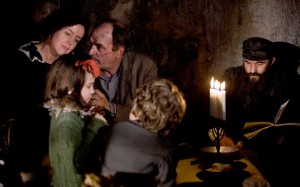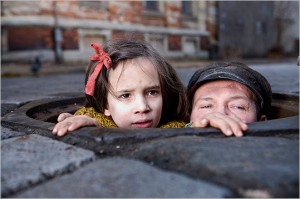
It’s impossible to deny that Agnieszka Holland’s In Darkness is a well made film with a lot on its mind. It might even be said to be an important film. This, however, doesn’t mean that this is a pleasant movie. In fact—despite flashes of humanity to one side—it’s one of the grimmest and claustrophobically unpleasant movies I can recall. I don’t say this to dissuade anyone from seeing the film, but I think it’s only fair to note this fact. Still, you don’t expect Holocaust stories to be “fun,” so it might be a measure of its success that the film is disturbing.

This is a fact-based story about Leopold Socha (Robert Wiedkiwicz), a plumber and sewer worker in Lvov, Poland, who became a hero largely against his will, and certainly not by intent. In fact, he’s really a pretty dishonest fellow who augments his earnings via small-time criminal activities. He has no intention of helping the Jews he finds hiding from the invading Nazis in the sewer—at least until they offer him money. As far as he’s concerned, they’re strictly a money-making proposition. It’s only over the course of the film that he finds himself actually caring about these people and helping them without getting anything out of it—and in the face of grave danger.
The details of the Jews lives—and often deaths—in the sewers are the center of the film, and where the film is at its most grim. Some of these scenes are almost unbearable. Holland is very good at capturing the discomfort, the filth, the stench, the claustrophobia and what must have been the most mind-numbing boredom of the incredible 14 months these people spent hiding in the sewers. This is powerful stuff, but from a dramatic standpoint the entire weight rests on the shoulders of one unwilling hero.

The film is very carefully and cleverly—and maybe a little too slickly—built around Socha’s discovery of his own genuine humanity. It starts simply enough when his wife (Kinga Preis) tells Socha the very obvious (but not to him) fact that not only are Jews just like the two of them, but that Jesus was himself a Jew. That only plants the seed, though, and it isn’t an easily cultivated one. Even when it first really shows itself, Socha is essentially ashamed of his newfound humanity. Rather than merely accept the fact that he’s going to continue helping his charges without pay, he furtively gives the money to their leader so that he may appear to be paying Socha in front of the others. The relationship becomes increasingly complex over the course of the film, and despite the quality of the rest of the film, Socha is the character you’re most likely to come away from the film remembering. Maybe that’s as it should be, since Socha is ultimately the one bright spark in the lives of the people he comes to call “my Jews.”
In other respects, In Darkness may be historically accurate, but it occasionally feels too carefully doled out in specific dramatic set pieces. Ultimately, however, its power is greater than its shortcomings. Rated R for violence, disturbing images, sexuality, nudity and language.




He has no intention of helping the Jews he finds hiding from the invading Nazis in the sewer — at least until they offer him money. As far as he’s concerned, they’re strictly a money-making proposition. It’s only over the course of the film that he finds himself actually caring about these people and helping them without getting anything out of it — and in the face of grave danger.
That sounds like a mighty familiar plot synopsis.
If it’s what I think you think it’s similar to, it’s a lot less forced to me.